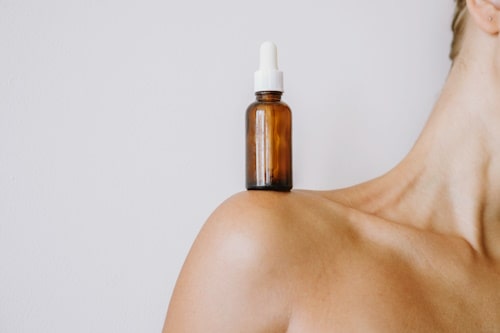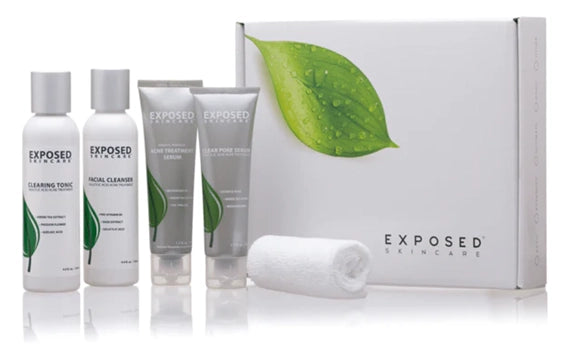Embarking on a testosterone FTM (Female to Male) transition is a journey of self-discovery and authenticity. However, it comes with certain challenges, including managing skin health, particularly acne.
This issue is primarily driven by the hormonal shifts that testosterone therapy brings about. This article delves into various proactive measures and treatments one can adopt to manage and prevent acne during this period.
Also read: How to choose the best acne treatment
Biggest Take-Aways:
- Acne during testosterone FTM transition is primarily triggered by hormonal shifts that increase sebum production, necessitating effective management and treatment strategies.
- A multi-faceted approach involving topical treatments, medication, and lifestyle modifications can help manage and prevent acne.
- Understanding and addressing the underlying mechanisms causing acne is crucial for effective management, promoting a positive self-image, and a smoother transition.
- Exposed Skin Care provides a tailored and comprehensive solution to manage acne, offering a reliable regimen to support individuals through their testosterone treatment phase.

Understanding the Mechanism of Acne in Transgender Patients
Acne is a common skin condition that can be exacerbated or triggered by hormonal changes. When embarking on testosterone therapy, transgender patients will likely experience increased sebum production, which can lead to clogged pores and acne.
Here's a closer look at how this process unfolds:
- Hormonal Shifts: Testosterone therapy is instrumental in developing secondary sex characteristics in FTM individuals. However, it also stimulates sebum production, a primary factor in acne.
- Sebum Production: Increased sebum levels can lead to clogged pores, which, when combined with dead skin cells and bacteria, form a perfect environment for acne development.
- Inflammation: Testosterone can also trigger an inflammatory response, which might exacerbate acne conditions.
By understanding the mechanisms behind acne onset during testosterone therapy, individuals can better prepare and implement strategies to prevent and manage acne.
Practical Guide: How to Prevent Acne While on Testosterone FTM
Preventing acne requires a multifaceted approach, especially when undergoing hormone therapy. Here are some practical steps to help manage and prevent acne during your FTM transition:
Topical Treatments
- Benzoyl Peroxide: An effective over-the-counter option to treat mild to moderate acne. It's known for its antibacterial and exfoliating properties.
- Salicylic Acid: Helps unclog pores and resolve lesions. It's suitable for treating mild acne.

- Topical Retinoids: Derived from Vitamin A, retinoids effectively treat mild to severe acne by promoting cell turnover and preventing pore clogging.
Medication
- Isotretinoin: A strong medication used to treat severe or persistent acne. It's essential to monitor its usage closely due to its potent nature.
- Oral Antibiotics: Helps reduce bacteria and inflammation, commonly used for moderate to severe acne.
- Spironolactone: Although primarily an anti-androgen, it has shown promise in managing acne by reducing sebum production.
Skin Care Routine Essentials and Updates
- Gentle Cleansing: Cleanse your face twice daily to remove excess sebum and dead skin cells without irritating your skin.
- Moisturizing: Use non-comedogenic moisturizers to hydrate your skin without clogging your pores.
- Regular Exfoliation: Exfoliate your skin 1-2 times weekly to promote cell turnover and prevent pore clogging.
Lifestyle Modifications
- Diet: Adopt a balanced diet rich in antioxidants, and consider reducing dairy and processed food intake, which could exacerbate acne.
- Stress Management: Engage in stress-reducing activities, as stress can trigger sebum production.
- Regular Exercise: Exercise can help regulate your hormone levels and reduce stress.

Tackling Moderate to Severe Nodulocystic Acne
Moderate to severe nodulocystic acne can be particularly challenging to manage. It often requires a more intensive treatment approach:
- Combination Therapy: Combining topical treatments with oral medication often yields better results in managing severe acne.
- Chemical Peels: They can help reduce the appearance of acne scars and control acne by exfoliating the skin.
- Regular Professional Check-ups: Regular check-ups with a healthcare professional familiar with transgender health and acne management are crucial to monitor your skin’s response to different treatments.
Embracing Clearer Skin with Exposed Skin Care
Transitioning is a journey that involves various aspects of self, and maintaining skin health is a vital part. Experiencing acne is common when starting testosterone treatment. This is where Exposed Skin Care offers a tailored solution to manage and treat acne.
Here's how Exposed Skin Care can benefit you:
- Comprehensive Treatment: Exposed Skin Care products are formulated to treat acne at various stages, whether hormonal acne triggered by testosterone treatment or mild to moderate acne that many FTM patients face.
- Gentle Yet Effective: The products are designed to be gentle on the skin while effectively treating acne, making them suitable for patients with moderate to severe acne conditions.
- Holistic Approach: The treatment of acne goes beyond just topical applications. Exposed Skin Care considers the holistic management of acne, addressing underlying issues like sebum production that cause acne.
- Ease of Use: With a regimen that’s easy to follow, individuals can seamlessly incorporate Exposed Skin Care into their daily routine, working towards reducing acne from the onset of testosterone treatment.
The journey of aligning one's physical appearance with an individual’s gender identity is a long-term commitment. The proper acne treatment can significantly ease this path, ensuring that the focus remains on the celebratory aspect of transitioning.
Conclusion
The journey towards self-actualization for transgender patients on testosterone is often marred by the onset of FTM acne, a form of hormonal acne that arises due to the hormonal shifts experienced during this transition.
The rise in testosterone levels, akin to what adolescents report having had, triggers sebum production, which clogs pores and fosters acne. This often occurs within 2 years of starting testosterone therapy, marking a period where acne treatment becomes imperative.
Various treatments have been underlined, ranging from topical antibiotics to oral contraceptives. However, certain medications like oral isotretinoin or anti-androgens like drospirenone may be contraindicated or may not see the desired improvement; hence, a more targeted treatment is often sought.
The landscape of acne treatment is vast, but finding what works long-term for this particular population requires a more nuanced approach. This is where Exposed Skin Care enters the scene, offering a tailored approach to treating acne for transgender patients.
As these individuals receive MHT (Masculinizing Hormone Therapy), a specialized regimen that understands the underlying causes of acne in such transitions is paramount. Exposed Skin Care, with its holistic approach, addresses the acne and underlying sebum production issues, providing a comprehensive solution.
The path of self-discovery and transitioning is a long and personal one. Along this path, having a reliable solution like Exposed Skin Care that treats surface acne and works to mitigate the underlying causes can be a valuable asset.
FAQs
What triggers acne during testosterone FTM transition?
Hormonal shifts, particularly the increase in testosterone levels, trigger sebum production, leading to clogged pores and acne.
How can one manage acne while on testosterone treatment?
Management involves a combination of topical treatments, medication, a good skincare routine, and lifestyle modifications like a balanced diet and regular exercise.
What is the significance of treating acne in transgender patients?
Treating acne is crucial for maintaining a positive self-image and confidence during the transitioning journey, aligning one's physical appearance with gender identity.
Why is Exposed Skin Care recommended for managing acne during testosterone treatment?
Exposed Skin Care offers a tailored and holistic approach to treating acne, addressing both the acne and underlying sebum production issues, making it a reliable solution for transgender individuals on testosterone treatment.



















